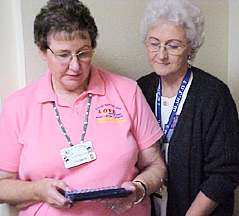explore_622_60903
Posted: 6/06/03
LifeWay Explore the Bible Series for June 22
The law reveals sin, but only Christ redeems
Galatians 3:21-4:7
By Jim Perkins
Madison Hills Baptist Church, San Antonio
It has been said that to appreciate best the place where you are now, you need look no further than the place from which you came. We would be wise and blessed to do just that.
Appreciate the past
Paul reminded his readers in 3:15-18 of the impact of a distant, yet vital event: The promises of God to Abraham–and specifically the coming of the Seed (Christ)–historically preceded the introduction of the law of Moses by 430 years. Much the same as with a legal will, the covenant God established through Abraham remained in effect; its promises were unchanged and still valid even through passing of the centuries.
The apostle, however, does not denigrate the law in this passage. The law was not “opposed to the promises of God” (3:21), but instead served God's predetermined purposes.
 |
Although impotent to save people–salvation is always by faith–the law did function to demonstrate mankind's universal and dangerous plight: Our inevitable propensity to sin. The law illuminated our inability to gain righteousness through ill-fated attempts at justification through obedience to the law, and as a consequence propelled us toward the promise of faith in Christ as Savior.
One other picture of the law is offered in 3:24-25. Paul described the function of the law as a type of stern, disciplinary “babysitter” or “guardian”–a term his Greek audience would have understood very well. The image here was of a very stern disciplinarian who accompanied the young person in his care, and who was not above using the rod to reinforce lessons and ethical mores. As such, the law did not function to wean us from sin, but instead to reveal the depth of our inevitable rebellion and the hopelessness of any self-help program.
Acknowledge
your new family
Such a grand statement in 3:26: “You are all sons of God through faith in Christ Jesus”! It serves as a fitting summary of the truth of the gospel: Through faith in Christ we have gone from a minor experiencing the harsh tutelage of the law (3:25), to an adult child of God, with all the rights and privileges of an heir of the promise to Abraham. We join with John as he proclaimed with great joy “that we should be called children of God! And that is what we are!” (1 John 3:1).
At the same time, to be a son or daughter of God through faith in Christ also means we are joined together with all other believers as members of a new family–the family of God. Because of our relationship to the Father, old classes or distinctions lose their importance; all have equal access to new life in Christ (3:28). Let us not forget Paul's radical (for his time) and joyful proclamation of this truth. Gender, race and social class–they were and are still today meaningless as a basis for relating to God and to one another as the family of God.
Do be faithful, however, to interpret this passage within its context and with due respect for Paul's intentions as inspired by the Spirit of God. We should neither diminish nor improperly expand its intended application to right standing with God and membership in the family of God. Additional arenas of church life are addressed in other Pauline passages; we will look there for biblical guidance.
Accept your new privileges
As becomes obvious to all Christians who spend time in his letters, Paul was a master writer and illustrator. In the current passage, the apostle has employed several analogies to emphasize the rights and freedoms we enjoy as we each become an obedient child of God through faith in Christ. Paul has reminded us that we are no longer under the curse of the law (3:13), nor are we shut up as a prisoner of sin (3:22). We are freed from the necessity of that harsh baby-sitter (3:24), and freed from the tyranny of being judged by race, rank or gender (3:28).
Paul added the analogy of a child who was an heir, but also a minor. Because of his young age, he was subjected to the strict guidance of guardians–which in some ways left the minor heir with rights no different than a slave (4:1). By contrast, however, Christians have received the full rights of an heir through faith in Christ. We are confident of this truth because of the witness of the Holy Spirit, who dwells within the believer. Through the comfort and confidence imparted because “God sent the Spirit of his Son into our hearts,” we naturally call out to our God with the appellation of respect and familial closeness: “Father” (4:6).
One last warning is appropriate: Avoid adherence to enslaving “basic principles of the world,” whether pagan religious practices exclusively, or also certain requirements of Jewish law. In either case, these basic–even evil–principles were made irrelevant because of the perfect Son, who was sent at the perfect time to redeem perfectly (and grant full rights of sonship to) those formerly under the law (4:3-5).
Questions for discussion
![]() What “basic principles” of the world threaten the freedom we enjoy to serve Christ obediently and faithfully?
What “basic principles” of the world threaten the freedom we enjoy to serve Christ obediently and faithfully?
![]() In what manner have the truths of 3:28 influenced your personal life and the life of your church?
In what manner have the truths of 3:28 influenced your personal life and the life of your church?
